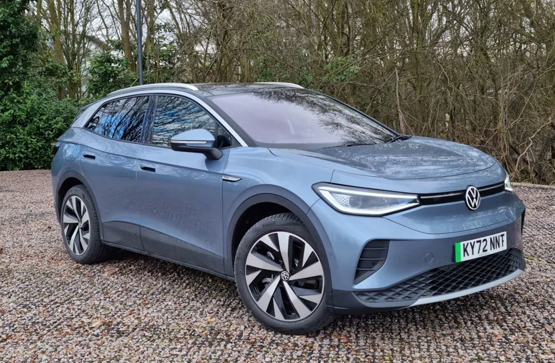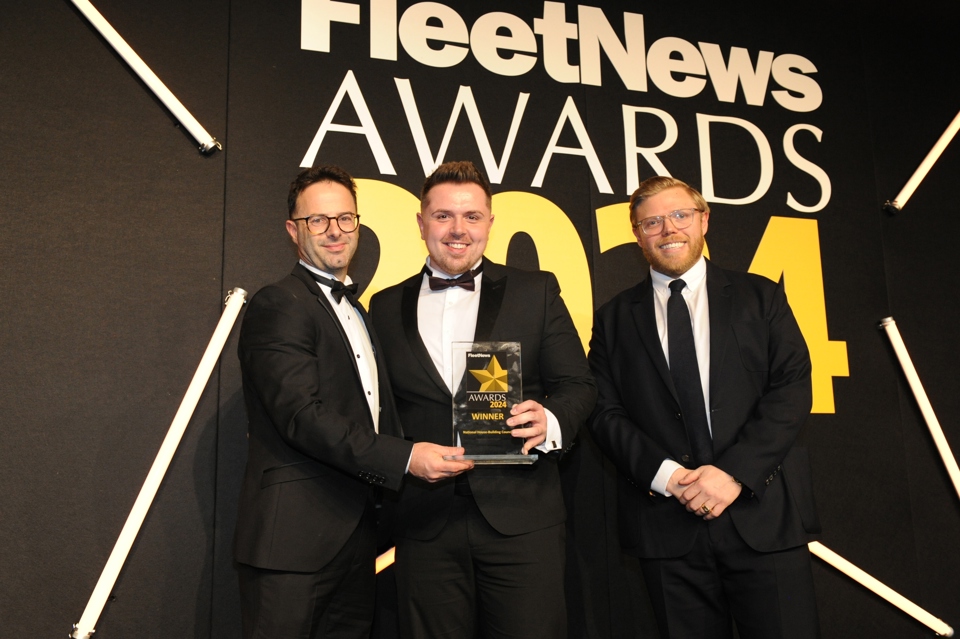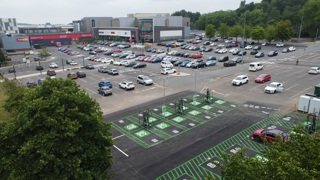A focus on getting company drivers in rural areas into an electric vehicle (EV) is a major part of the National House Building Council’s ongoing decarbonisation plan.
It is also set to launch a salary sacrifice scheme all employees, aiming to significantly reduce overall company emissions.
With more than 90% of its 700-vehicle fleet already electrified and an EV-only car choice list set to be introduced, the fleet team at the National House Building Council (NHBC) is well-positioned to help the organisation achieve its goal of becoming net zero by 2040.
In March, sourcing and contracts specialist Benjamin Mann proudly accepted NHBC’s Fleet of the Year (251–1,000 Vehicles) award at the Fleet News Awards. Sponsored by Northgate, the category recognised NHBC’s impressive commitment to reducing transport emissions across its operations.
Awards judges praised Milton Keynes-based NHBC for its “structured and targeted approach to decarbonisation while maintaining high levels of safety and risk compliance across a varied fleet. It offers plenty of support to drivers to smooth the road to electrification”.
“The difference between where we were in 2020 and where we are now is like night and day,” Banjamin Mann, NHBC
Mann credits the company’s award success to the collaborative efforts of its fleet steering group, which includes key decision-makers from finance, procurement, HR, and other departments.
A focus on getting company drivers in rural areas into an electric vehicle (EV) is a major part of the National House Building Council’s ongoing decarbonisation plan.
It is also set to launch a salary sacrifice scheme all employees, aiming to significantly reduce overall company emissions.
With more than 90% of its 700-vehicle fleet already electrified and an EV-only car choice list set to be introduced, the fleet team at the National House Building Council (NHBC) is well-positioned to help the organisation achieve its goal of becoming net zero by 2040.
In March, sourcing and contracts specialist Benjamin Mann proudly accepted NHBC’s Fleet of the Year (251–1,000 Vehicles) award at the Fleet News Awards. Sponsored by Northgate, the category recognised NHBC’s impressive commitment to reducing transport emissions across its operations.
Awards judges praised Milton Keynes-based NHBC for its “structured and targeted approach to decarbonisation while maintaining high levels of safety and risk compliance across a varied fleet. It offers plenty of support to drivers to smooth the road to electrification”.
“The difference between where we were in 2020 and where we are now is like night and day,” Banjamin Mann, NHBC
Mann credits the company’s award success to the collaborative efforts of its fleet steering group, which includes key decision-makers from finance, procurement, HR, and other departments.
“Winning an award was huge for us,” Mann said. “It’s external recognition for the hard work and dedication that so many people at NHBC have contributed.”
With a background in procurement, Mann joined NHBC in 2028 as a sourcing contract specialist. Two years later, his role expanded when the procurement department took over the contractual aspects of the company’s fleet.
His passion for cars, love of technology and procurement career choice made this opportunity a perfect fit, allowing him to merge his professional expertise with his personal interests.
Rural area concerns
Of NHBC’s 700-strong fleet, around 630 vehicles are classified as job-need vehicles, primarily used by employees in the claims and inspection department. NHBC provides warranty and insurance for new-build homes and these employees travel across the country to assess insurance claims on properties.
The cars are leased on 48-month/60,000-mile contracts and currently 67% of the fleet (470 vehicles) is fully electric, and an additional 27% (190 vehicles) consists of plug-in hybrid electric vehicles (PHEVs). This means that 94% of the fleet has some form of electric capability.
The remaining vehicles are diesel-powered and used by employees working in rural areas where range anxiety and limited charging infrastructure remain significant challenges.
With NHBC’s ambition to become a zero-emission organization by 2040, Mann and the fleet team are making impressive progress in driving the company toward this goal.
In 2020, when Mann became involved, the fleet makeup was 98% diesel and just 2% PHEV.
Fleet steering committee
Mann and NHBC’s fleet steering committee developed a comprehensive proposal for the company’s executive board, outlining strategies to significantly reduce the fleet’s annual CO2 emissions of 2,000 tonnes and ease the tax burden on drivers by offering more favourable benefit-in-kind tax options.
“The difference between where we were in 2020 and where we are now is like night and day,” Mann explains. “We produced a paper that essentially highlighted, ‘Yes, EVs are more expensive to lease, but they are cheaper to run.’ From a whole-life cost perspective, transitioning to electric vehicles made perfect sense.”
The process also gave the team an opportunity to reassess fleet needs, identifying whether certain vehicles were still necessary, particularly in cases where employees had transitioned to new roles that no longer required a company car.
“COVID and the lockdowns gave us the chance to pause, reset, realign, and move forward with a choice list that, for the first time, offered drivers access to an EV or PHEV,” Mann explained.
To encourage EV adoption, the company introduced the Volkswagen ID.4.
“We selected a car that was spacious enough for a family and had a range suitable for most drivers’ daily needs,” Mann said. “Electrifying when we did was a win for everyone. It benefited the business by reducing our emissions, helped drivers with lower tax bills, and reduced their personal environmental impact.”
Mann also noted that the company is exploring several options to support rural employees in making the switch to electric vehicles.
For employees unable to install a home charger and reliant on the public charging network, NHBC has recently introduced a scheme offering increased reimbursement rates. This initiative aims to support these drivers by offsetting the higher costs associated with public charging
Tackling electrification barriers
“It’s about tackling the barriers,” Mann said. “We can’t control whether an employee can have a charger fitted at home, and we don’t want those who will have to rely on the public charging network to be negatively impacted. If that’s a barrier to them going electric, then we’ve removed that barrier.”
The company offers financial support to employees who can install a charger at home, with both the vehicle and charging point arranged through its leasing supplier, Novuna.
Employees have benefited from average tax savings of around £3,700 per year, which has been a key factor in the success of NHBC’s electrification efforts, alongside strong backing from company executives committed to reducing fleet emissions.
 Volkswagen’s ID.4 (pictured) now makes up more than 50% of the fleet, and the manufacturer’s larger ID.7, boasting an official WLTP range of 440 miles, will soon be added to an EV-only choice list.
Volkswagen’s ID.4 (pictured) now makes up more than 50% of the fleet, and the manufacturer’s larger ID.7, boasting an official WLTP range of 440 miles, will soon be added to an EV-only choice list.
Mann said: “That’s the sort of range that will encourage our rural colleagues to go electric, and the fact that the charging network has also improved massively will help, too.”
With support from its leasing provider, Novuna, NHBC has created an online EV hub to address any concerns drivers may have about transitioning to electric vehicles.
“There are very few roles where an EV isn’t optimal,” Mann explained. “The online hub is there to answer any driver questions and provide them with peace of mind.”
NHBC also takes a comprehensive approach to driver safety and well-being.
All drivers are required to complete an annual online driving for work risk assessment and a yearly licence check as a minimum. Drivers who fail to complete either of these may lose their eligibility for a company car.
The company believes that driver well-being is closely tied to safety and mobility. Many vehicles are used on construction sites, so spare wheels have been replaced with emergency inflation kits. Additionally, a rapid tyre response service is available to drivers who regularly travel on unfinished roads.
NHBC has also reviewed its risk management policy and secured partnerships with suppliers who provide services for driver risk assessments and profiling, vehicle telematics, license checks, vehicle inspections, and dashcam installations.
Awards judges praised NHBC for its “structured and targeted approach to decarbonisation while maintaining high levels of safety and risk compliance across a varied fleet. It offers plenty of support to drivers to smooth the road to electrification”.
Fleet manager skills
Seeing the big picture rather than getting lost in the details is a vital skill for any fleet manager, according to Mann.
He highlights an example where some fleets dismiss electric vehicles (EVs) simply because their lease costs are higher than those of diesel equivalents.
“You need to step back and consider the broader value proposition, ensuring you're not just comparing apples to oranges,” he explains. “This includes evaluating factors like insurance costs and the safety benefits of the vehicles.”
Mann also emphasises the importance of adaptability and openness to change, qualities he believes are essential for today's fleet managers.
“Forward planning is also key,” he added. “As is building strong relationships with your suppliers.”
Login to continue reading.
This article is premium content. To view, please register for free or sign in to read it.


















Login to comment
Comments
No comments have been made yet.